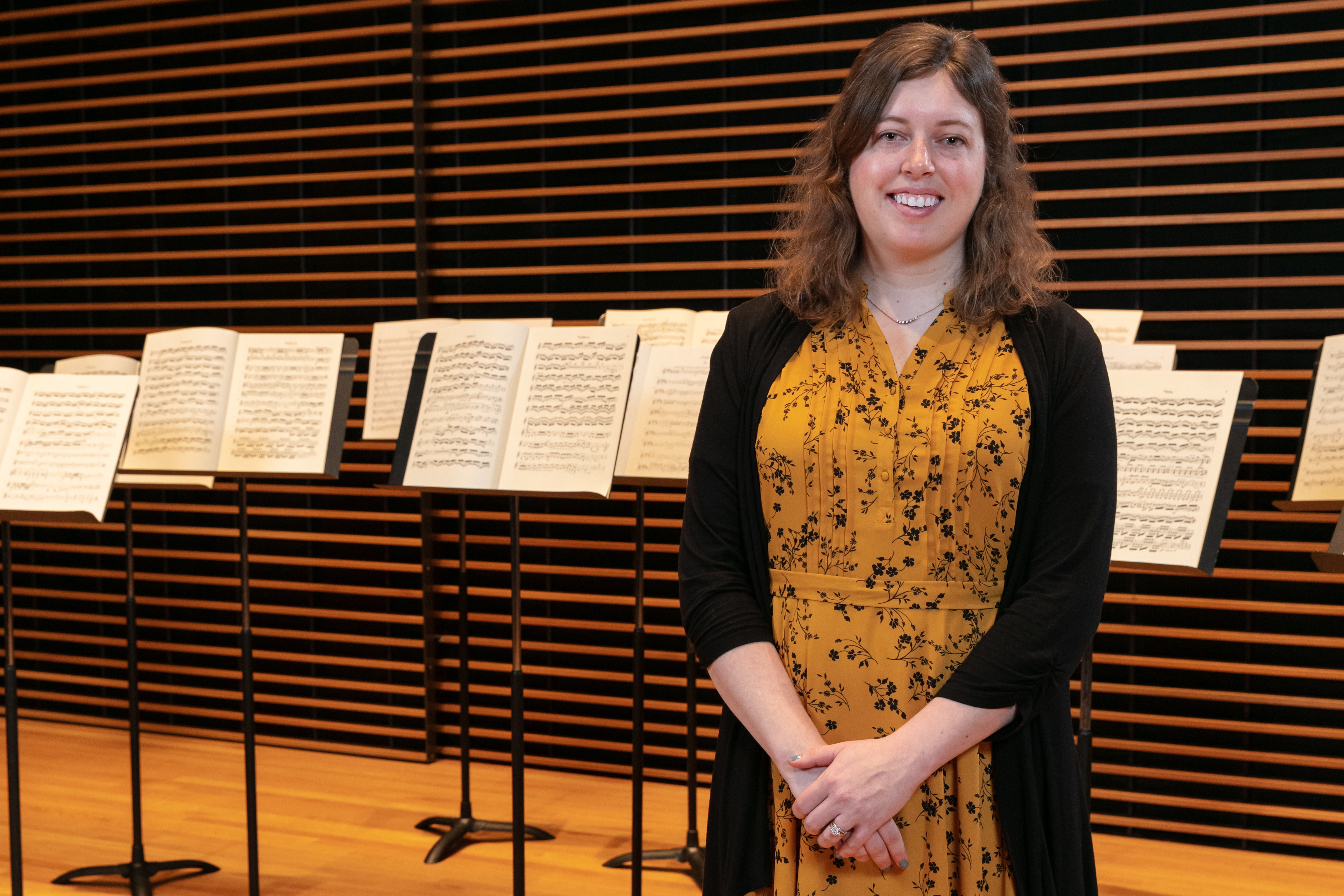 Genevieve Beaulieu has served as the coordinator of performance services and the instrumental library at School of Music since August 2019. (DePaul University/Randall Spriggs)
Genevieve Beaulieu has served as the coordinator of performance services and the instrumental library at School of Music since August 2019. (DePaul University/Randall Spriggs)Despite the COVID-19 pandemic mostly quieting the halls of the School of Music’s Holtschneider Performance Center, Genevieve Beaulieu’s days haven’t slowed down. As the coordinator of performance services and the instrumental library at DePaul’s School of Music, Beaulieu is tasked with keeping track of thousands of moving parts on any given day.
Since the mid-March shutdown, Beaulieu has learned new skills that have become imperative during the shift to online performances. These includes ensuring the School of Music has proper licenses for any videos that are posted to its YouTube and social media channels featuring music that’s still under copyright.
“This was certainly not my area of expertise before the pandemic, but I received great advice from fellow librarians around the country, and I know this skill will come in handy when we post future livestream videos online,” Beaulieu says.
Some jobs haven’t changed during the pandemic, however. Beaulieu writes all the contracts, collects the performers’ paperwork and sends out rehearsal schedules. She also finds music in DePaul’s library or acquires it from an outside source once ensemble conductors decide on their repertoire for each quarter.
“When we have the music in hand, student librarians organize parts for each musician and write in anything conductors need like string bowings or measure numbers. Materials from the Ensemble Library are different from content you would check out of the Richardson Library because musicians write in their parts to keep from making the same mistakes,” Beaulieu says.
When the music is ready to be passed on to another student, the ensemble librarians erase the markings.
Much of her work also consists of updating the current systems and processes in place, like the recital process and the programs.
“Before, students were looking at this bubble diagram with instructions about the entire recital process, which included, among other things, selecting a date, booking a hall, writing up a program and notes, and scheduling dress rehearsals. We turned all the information into a typical word document that I hope is much easier to understand,” Beaulieu says.
In a normal year, Beaulieu would also create the programs for performances, secure the music for numerous ensembles and serve as the personnel manager for Christmas at DePaul. Alongside Eric Esparza, the Christmas at DePaul conductor, Beaulieu works to get all the musicians lined up for the event, which would usually involve two soloists, 16 singers to sing with the DePaul Community Chorus and an orchestra of around 45.
Because the 2020 performance shifted online and was branded as
Christmas from DePaul, Beaulieu’s role was targeted to finding instrumental musicians.
“I think the production this year was a huge task to pull off, and I was glad to see the end result went so well,” she says. “And, of course, it was nice to see a bunch of familiar faces performing, even if it wasn’t in person.”
As an undergraduate at The Ohio State University, Beaulieu initially studied engineering but soon realized her talents in musical performance were more than just a hobby. After earning a Bachelor of Music in bassoon performance, she attended Michigan State University, receiving a Master of Music and a Doctor of Musical Arts in bassoon performance.
Before coming to DePaul in August of 2019, Beaulieu lived the freelance lifestyle, performing bassoon all over Michigan in orchestras on the weekends, and teaching or attending rehearsals during the week.
Her passion for working with students is evident, and she cites it as her favorite part of the job.
“Working with them and teaching them what I know, and then learning from them too, because there’s a lot that they know that I don’t, is so exciting,” she says.
When she went to the office every day before the pandemic, Beaulieu would practice the bassoon in her office before the start of the workday. Last February, she was able to perform with the DePaul Concert Orchestra.
“The other bassoonist was one of my student employees, and it was great to see her in her element and confident as a performer,” Beaulieu says.
Working with ensemble coordinators like Michael Lewanski allows Beaulieu to enjoy the performer side every so often instead of only the audience side of performances.
“You don’t get to see many facial expressions from the audience perspective, and it makes performing 100 times better with a conductor who looks like they are happy and enjoying themselves,” she says.